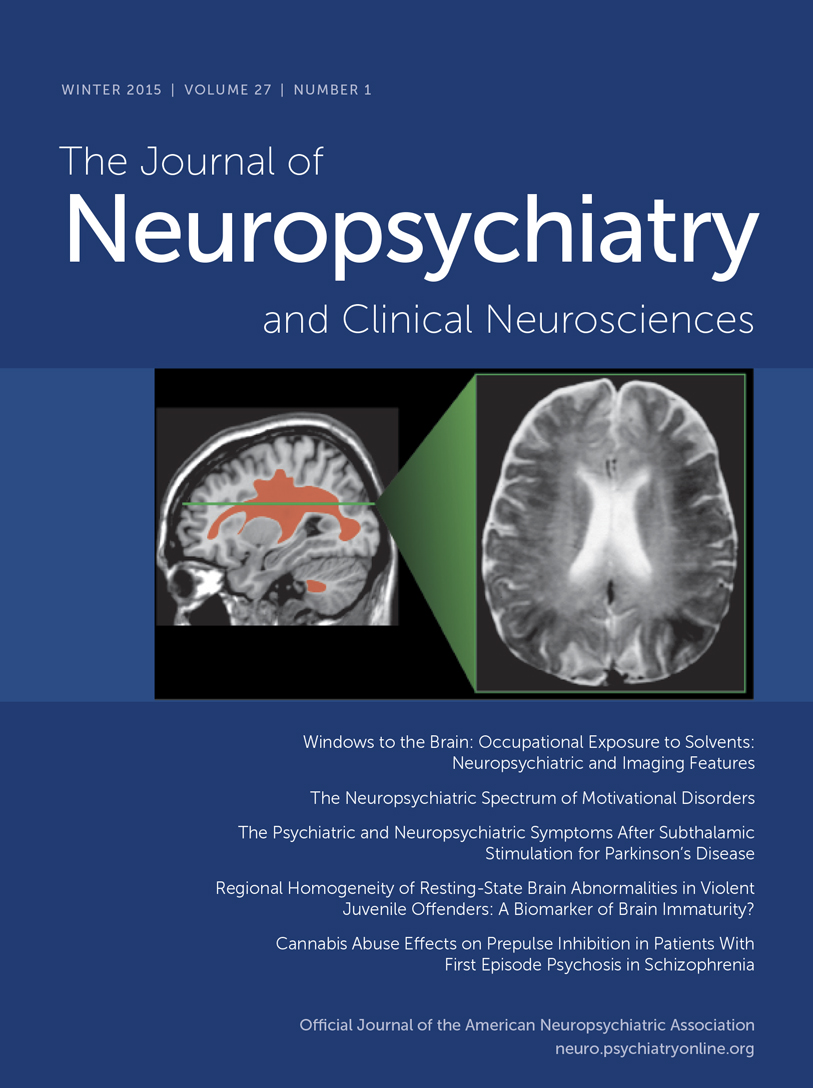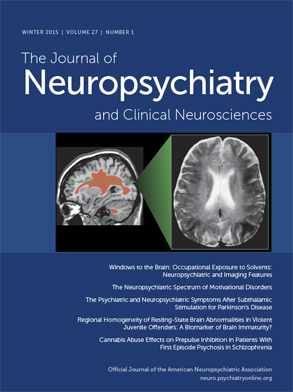To the Editor: Voltage-gated potassium channel (VGKC) antibody–associated encephalitis is a neuropsychiatric condition that is potentially fully reversible with early diagnosis and treatment with immunotherapy. Although it is often characterized by amnesia, disorientation, and seizures, it is still very poorly characterized, and a myriad of presentations have been described. Here, the authors broaden the phenotypic spectrum of psychiatric manifestations associated with VGKC antibodies by reporting a patient of Chinese ethnicity who presented with a first-episode schizophrenia-like psychosis in the absence of overt seizures or other focal neurological features.
The VGKC antibody-associated encephalitis is to date still very poorly characterized, with a myriad of manifestations encompassing neurological syndromes, amnestic disorders, seizures, hypothermia, and predominantly depression or anxiety-related psychiatric symptoms.
1,2 Furthermore, reports of association between VGKC antibody-associated encephalitis and neuropsychiatric disorders have largely been from white populations.
3–5 Here, we describe a patient of Chinese ethnicity who was positive for VGKC antibodies, presenting initially with schizophrenia-like psychotic symptoms in the absence of overt seizures or other focal neurological features.
Case Report
A 19-year-old Chinese woman first presented in February 2013 with a 1-week history of disorganized behaviors. Corroborative information obtained from her parents revealed that she had appeared scared and tearful in the week prior to admission. She had complained of feeling possessed by spirits, feeling that her thoughts were blocked, and had experienced paraprosopia where she reported seeing the faces of her relatives metamorphose into a grotesque distortion. Further history elicited from the patient revealed that she had been experiencing passivity and auditory hallucinations for a month. On mental state examination, she was perplexed and had a blunted affect. She also had speech latency and conversed in monosyllables. Of note, she had prominent cognitive impairment with a Mini Mental State Examination (MMSE) score of 17/30 and a Montreal Cognitive Assessment score of 8/30.
Given the acute onset of her symptoms and cognitive impairment, she was referred to a neurologist for evaluation of organic causes for her presentation. Initial biochemical, hematological, and microbiological investigations performed on blood, urine, and cerebrospinal fluid did not reveal significant abnormalities. Brain MRI scans and ECG were unremarkable. The patient was provisionally diagnosed with brief psychotic disorder and was treated with olanzapine. Notably, she developed remarkably severe psychomotor retardation with olanzapine 10 mg once nightly.
Serum VGKC antibody was later found to be positive at 373 pmol/L (normal < 100 pmol/L), whereas serum N-methyl-d-aspartate (NMDA) receptor antibody was negative. Repeat serum VGKC antibody for confirmation remained positive at 406 pmol/L. Given her atypical presentation, prominent cognitive impairment, and psychomotor retardation with low-dose olanzapine, a decision was made to treat the patient with a course of steroids after discussion with her and her parents.
The patient was treated with a 5-day course of intravenous methylprednisolone and became notably calmer, less anxious, and was able to sleep well. At the last review in August 2013, there was resolution of her psychomotor retardation, and she had shown cognitive improvements, with an MMSE score of 27/30 and a Montreal Cognitive Assessment score of 29/30.
Discussion
To our knowledge, this is the first report of an Asian patient with VGKC antibody–associated encephalitis presenting with schizophrenia-like psychosis in the absence of overt seizures or other focal neurological features.
Serological tests for VGKC antibodies are not routinely performed in the assessment of patients with first-episode psychosis. VGKC and NMDA receptor antibodies are important biomarkers of potentially reversible immune-mediated encephalitis, which may mimic schizophrenia, a major mental illness with guarded prognosis requiring long-term antipsychotic therapy. There may be a role for systematic screening of current identified autoantibodies to neuronal surface antigens in patients with psychotic disorders to characterize the prevalence of immune-mediated encephalitis among these patients, with implications for diagnosis, prognosis, and treatment.

